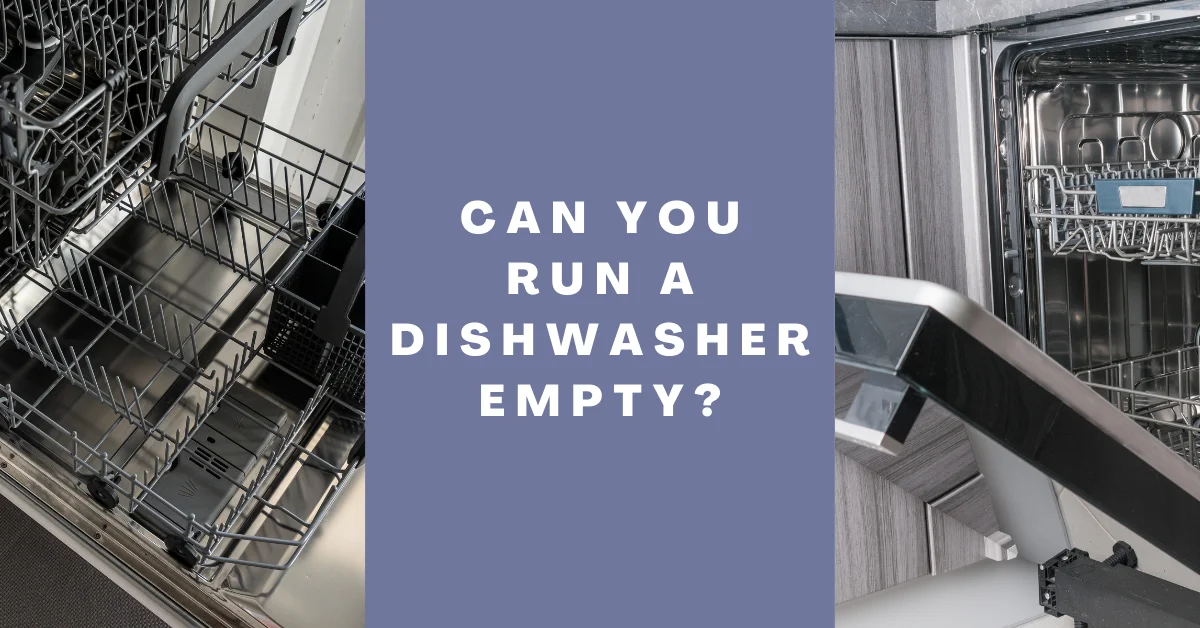Everyone is a bit queasy about using a new dishwasher upon buying it. Of course, we want the machine to stay in tip-top condition, right? So, for the first time, can you run a dishwasher empty? Or, if you want to clean your dishwasher from the inside, is running it empty safe?
Yes, you can run your dishwasher empty, just like you would do with a normal cycle. If you want to clean your dishwasher, sprinkle a little baking soda or throw some white vinegar inside and let it sit overnight. The next day, run an empty load to clean the dishwasher.
Just like any other appliance, a dishwasher, too, needs cleaning for it to work properly. We will discuss how, when and what to do for the process to run smoothly and safely. So, keep on reading!
Run a dishwasher empty for the first time
You should run an empty load in the dishwasher with no detergent or dishes for the first time. This will help you find out if there are any installation issues or loose pipes.
This will also help you get a grip on how the process works.
Running the dishwasher half-empty
In every dishwasher, there is an ideal load size. If you run a dishwasher half-empty, you risk breaking your dishes as they might bump around, and you will also waste a lot of water.
If you don’t have enough dishes to put in your dishwasher, you should consider buying a smaller one or getting more dishes to fill your dishwasher up to the mark for it to function properly.
What happens if you run the dishwasher without water?
You might end up damaging your dishwasher if you run it without water too many times. This is because water is a mandatory part of your dishwasher. Running it without water can damage the heating element and the dishwasher pump.
Moreover, it might be “stalled” when you try to run it next time. Though there won’t be any significant damage to your dishwasher, you might void its warranty as water is a significant part of your dishwasher. Plus, you may also reduce its lifespan.
You might be wondering if you can run a dishwasher without hot water. Well, hot water cleans your dishes better, and that is why damage to the heating element can stop the water from getting hot inside the dishwasher.
Signs that your dishwasher needs cleaning
There are a number of signs that indicate it is time to clean up your dishwasher by running it empty. Here are some of them!
Unpleasant odor
Your dishwasher giving off an unpleasant odor is a sign that it needs to be cleaned. Bad odor coming from the dishwasher may strip the charm off of your kitchen altogether.
Several factors lead to bad odor, including food residue sticking on the insides, food particles clogging the filters, using too much hot water, or excessive detergent.
Food buildup in the filters
A dishwasher filter goes through the wringer, so it is crucial to keep foreign objects and food particles out.
If your dishes come out unclean or only some of them come out clean, it is a sign that your filters are clogged. If this continues to happen, you should check your filter and clean out any debris and clean the fine screen filter.
Refer to your dishwasher’s manual to see if the filter is detachable and cleanable.
Rust in the machine
Rust buildup in your dishwasher can be a major health hazard. If your dishes are coming out with rust, ensure washing them before putting food on them.
Similarly, rust can cause damage to your dishwasher too by clogging the dishwasher, which leads to a faulty appliance. Keeping your dishwasher clean will prevent it from rusting.
Food stuck in the sprayer arm
The dishwasher sprayer arm must be clean from any dirt and debris for it to properly clean your dishes.
To clean the sprayer arm, detach it and soak it in a water and vinegar solution. Let it soak until all the debris has separated. Then clean with water and shake out all the debris.
How to clean your dishwasher
Follow the steps below to clean your dishwasher properly:
Step 1: Start with an empty dishwasher and pour vinegar/baking soda
For old dishwashers, pour in a gallon of distilled white vinegar in the bottom unit and let it sit for 3-4 days. The latest models of dishwashers do not require an entire gallon and can be cleaned with a cup too.
You can also sprinkle in some baking soda and leave it for a day.
Step 2: Run a cycle
After the time has passed, run a cycle with the highest and longest setting without any dishes or detergent. This helps to remove any residual food particles from the pump and motor, washing away grease and odors. It also keeps your dishwasher smelling fresh.
Step 3: Clean the spray arm, tub, and rack
Once the motor and filters are clean, clean the spray arms, tub, and rack with a dishwasher cleaner. Repeat this step until the spray arm is completely clean from any food particles. This step will remove any buildup from the dishwasher and reduce hard water issues.
Related FAQs to running a dishwasher empty
Can you run vinegar through the dishwasher?
Yes! You can use vinegar in your dishwasher every once in a while to clean it.
Pour a cup of distilled white vinegar into the bottom of the empty dishwasher, or you can pour it into a cup and place it inside. Then, simply run an empty load. This can make your dishwasher clean and fresh.
Should a new dishwasher have water in it?
Don’t worry if your brand new dishwasher has some water. This is because the dishwashers are tested at the factory before they are shipped. Having some water inside the tub or dripping from the drain hose is fine.
Wrapping up our thoughts on running a dishwasher empty
Dishwashers can be dreadful if they are not cleaned and maintained properly. There will be unpleasant smells, unclean dishes, and decreased longevity of the dishwasher. We’ve gone over running empty or half-empty loads in the dishwasher and instructed you on how and when to wash your appliance. Hope it helped!



